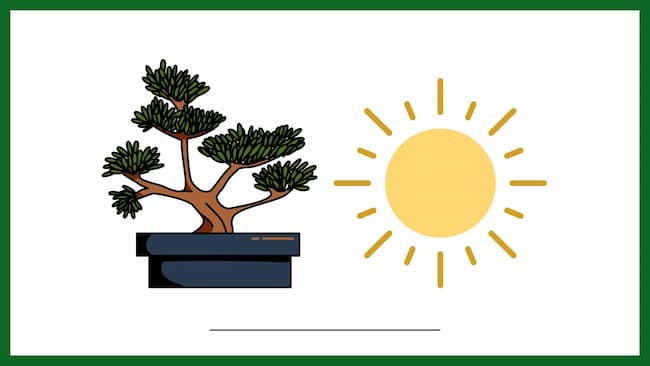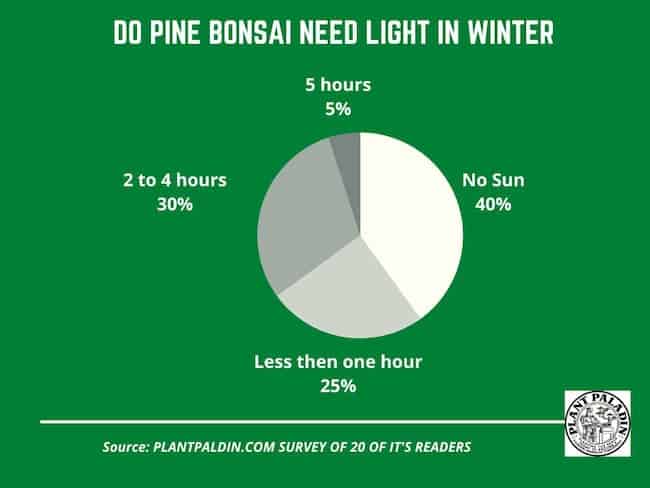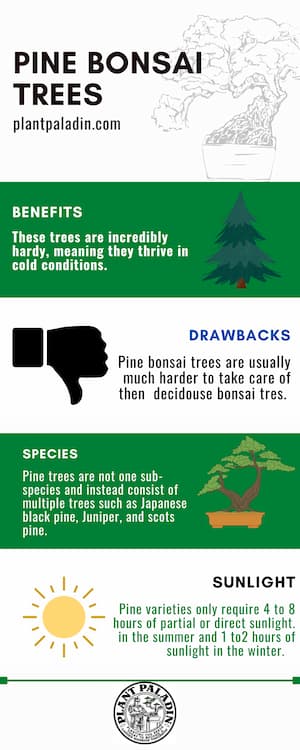This website is supported by its readers. If you click one of my links I may earn a commission. I am also a participant in the Amazon affiliates program and I will also earn a commission from qualified purchases.

So this year has been the first year I’ve managed to grow my pine outdoors, finally reaching maturity. That said, conifers, unlike the deciduous bonsai I own, like Chinese Elm and Ficus, need to be cared for slightly differently than the other bonsai in my collection. Naturally, this got me asking, do pine bonsai need light in winter?
Pine bonsai trees will only need between 1-2 hours of direct/partial sunlight in the winter, with most pine varieties requiring no sunlight due to winter dormancy in the species.
All pine bonsai varieties are incredibly hardy and will thrive with limited sunlight. The outdoor temperature is a more significant factor for pine bonsai than the amount of sunlight.
So how much sunlight is too much sunlight for a pine bonsai tree? And do different pine bonsai species need different amounts of light? Keep reading to find out more!
Just a quick heads up, over the past three years of running Plantpaladin, hundreds of people have asked for product recommendations. As such, You can find my favorite indoor bonsai tree here (link takes you to Bonsaiboy), my favorite outdoor bonsai tree (link takes you to Bonsaiboy), or have a look at all the products I recommend here.

Do pine bonsai need light in winter?
To determine if pine bonsai trees need light in winter, I contacted my local botanical gardens, visited a few bonsai experts, and surveyed 20 Plant Paladin readers who own pine varieties, asking them this question.
To summarise the findings:
- Most pine bonsai trees kept outdoors can thrive on the limited sunlight in winter.
- This is because, in the wild, pine trees grow in cold conditions with limited light for months on end, so many of these attributes have been passed on to bonsai.
- As such, most pine bonsai can survive on as little as one to two hours of direct sunlight per day or as much as four to six hours, depending on the weather.
- Most pine trees and evergreen bonsai varieties will enter a period of dormancy during cold winters and, when they do, will require no sunlight.
- Now while there are over 115 varieties of pine trees, this rule of limited sunlight in winter will work for all pine bonsai varieties.
- The most significant factor, however, when it comes to sunlight is the temperature. Should temperatures drop below 0 Fahrenheit for prolonged periods, even the hardiest pine bonsai trees will suffer.
- Should temperatures drop below 30F for prolonged periods, the metabolic rate of Pine bonsai will drop so low that they can get by on little to no sunlight during the entire winter.
- While pine bonsai can most likely be left outside during most winters, should temperatures drop too low, winds become too high, or UV rays become too powerful, consider moving your pine bonsai into a cold spot such as a garage without a heater.
- Avoid placing your pine bonsai tree indoors in warm conditions, as this can cause your tree to fall out of its winter dormancy.
How much light do pine bonsai trees need during winter?
As mentioned, most pine varieties only need one to two hours of direct sunlight daily to thrive.
Pine bonsai trees are incredibly hardy and used to cold temperatures and limited sunlight, meaning they can adapt well to high and low sunlight conditions.
Should your bonsai tree get more than four to six hours of direct sunlight daily, consider moving this to the shade.
This is because, during the winter, most evergreen species will enter a degree of dormancy, meaning that excessive sunlight might change your tree’s energy and nutrient flow at the wrong time.
On top of this, having surveyed many pine bonsai owners, many have stated that they have kept their pine bonsai with limited amounts of sunlight in dark garages with no detriment for years during the winter period.
Should you use artificial light for your pine bonsai in winter?
While it might be tempting to use artificial LED light for your bonsai tree during the winter, your pine bonsai tree will be perfectly fine with the sunlight it gets naturally.
I would only consider using an artificial grow light for my pine bonsai if there has been prolonged heavy rain and dark skies for months.
In this situation, where your pine bonsai may be getting less than one hour of direct or partial sunlight daily, I recommend using them.
Pine bonsai tree light requirements by species?
So now we know how much sunlight a pine bonsai tree needs in winter. What about specifics by species?
After all, pine bonsai trees are not one tree but are made up of hundreds of coniferous variations such as Japanese black pine, Scots Pine, and even Juniper trees.
The good news is that all pine bonsai varieties will thrive with only one to two hours of direct or partial sunlight per day. All evergreen coniferous trees are hardy and thrive well during low light and temperature periods.
To help, I’ve created a table below that highlights just some pine species and the differences in sunlight in the summer and winter months:
Species
Hours of sunlight in summer
Hours of sunlight in winter
Scots Pine
6 to 10
1 to 4
Japanese Black Pine
6 to 10
1 to 4
Mugo Pine
6 to 10
1 to 4
Japanese White Pine
6 to 10
1 to 4
Juniper
6 to 8
1 to 4
Temperature requirements of Pine bonsai in winter
So one of the big things it’s essential to note is the relationship between temperature and sunlight when it comes to the winter care of your bonsai.
You see, while most pine bonsai trees will thrive regardless of the direct sunlight they receive, the temperature will impact their health more.
For example, if you keep your bonsai in a greenhouse or there is a warm spell of weather in the winter months, this can cause your pine bonsai to become damaged in the spring and make it much less cold and hardy in the future.
Alternatively, while pine bonsai trees will thrive in cold conditions if the wind chill factor is too high and the roots become frozen in hyper-low temperatures, this can also significantly dehydrate and kill your tree.
As such, for best results, aim to keep your pine bonsai trees between 5 to 45 degrees Fahrenheit during the winter months to ensure your bonsai trees have a total period of dormancy.
What happens if you give your pine bonsai too much sunlight in winter?
While excessive sunlight (more than 8 hours in the winter months) with cold temperatures will have minimal impact on your tree during the winter months, should excessive sunlight be paired with warm temperatures can cause your pine bonsai to fall out of dormancy in the winter months.
This can result in a tree that becomes weaker in the spring and become much less effective at being efficient.
Excessive warm sunlight paired with cold wind chill winds can also aid in the dehydration and drying out of your tree.
Left unchecked, this will cause broken, brittle roots and branches.
How much sunlight is too much sunlight for pine bonsai trees in winter?
More than 8 hours of sunlight is too much for a pine bonsai tree in winter. Excessive sunlight will cause your tree to become dehydrated and fail to enter its dormant period. For best results, winter pine bonsai only requires two to four hours of partial sunlight daily in the winter.
Should you move pine bonsai indoors during winter?
Most pine bonsai varieties can be left outdoors during the winter months in most mild calamities. Should temperatures drop below 5 degrees F for prolonged periods, consider moving your bonsai into a cold frame or garage with a cold temperature.
Avoid placing your pine bonsai in temperature-controlled warm spaces near a heater or greenhouse, as this will kill your tree.
What should you do with your pine bonsai during winter?
So now we know about your bonsai’s sunlight and temperature requirements, what other aspects should you consider when caring for your tree in winter?
Watering:
Watering requirements may change during winter. Check the soil regularly, and only water when the topsoil feels slightly dry. Avoid overwatering, as this can lead to root rot, especially during colder months when the tree’s water uptake is slower. Typically, once per week will be more than enough.
Mulching:
Applying a layer of organic mulch around the base of the bonsai can help insulate the roots and protect them from temperature extremes. Mulch also helps retain moisture in the soil.
Avoid Fertilizing:
Refrain from fertilizing your pine bonsai during the winter. The tree is dormant, and fertilizing can encourage new growth, which is not ideal during this time.
Pruning and Wiring:
Winter is not ideal for significant pruning or wiring, as the tree is more vulnerable. It’s best to perform any significant pruning or wiring during the growing season in spring or early summer.
Monitor for Pests and Diseases:
Winter can be when pests and diseases become dormant, but watching your bonsai for any signs of problems is essential. Inspect the foliage and trunk regularly to catch any issues early.
Winter Watering Techniques:
In colder climates, where the water in the pot may freeze, consider using a watering can with warm water when rinsing your pine bonsai. This will prevent shock to the roots and ensure better water absorption.
Air Circulation:
Adequate air circulation is crucial for preventing fungal issues in the winter. Ensure your bonsai is not placed in a closed, stagnant environment.
Protect from Frost:
If frost is forecasted, consider moving your pine bonsai to a more sheltered location or covering it with frost cloth to protect it from freezing temperatures.
How much light does coniferous bonsai need in winter?
Coniferous bonsai trees, regardless of subspecies, will need, on average, between one to two hours of full or partial sunlight during winter. Most evergreen trees will enter a period of dormancy, requiring little to no sunlight.
Survey results
Finally, as mentioned, I surveyed 20 Plant Paladin readers who also own pine bonsai trees, asking them how much sunlight they provide their bonsai during winter.
Here are the results:

My top picks for the gear you will need!
So like I mentioned earlier, over the past three years of running PlantPaladin, hundreds of people have asked me for my recommendations on the best bonsai gear on the market.
Having spent thousands of dollars on bonsai items these past few years and tested at least 100 bonsai-specific products, I’ve listed my favorite products below – All of which I highly recommend and think you can get great value.
They can purchase directly by clicking the link to take them to Amazon.
Bonsai Tool Set: One of the significant challenges I’ve had is finding a toolset that was not only durable but didn’t break the bank. SOLIGT has recently developed a fantastic bonsai tool set that covers all the tools you need to trim, prune, and repot your trees. – You can grab it here.
Complete Bonsai Set: Many of you will want to grow your bonsai trees entirely from scratch, but finding the varicose seeds, pots, and other items in one place can be challenging. Leaves and Sole then have created a complete bonsai set that I’ve personally used that ticks all the boxes. You can grab it here.
Bonsai wire: The number of times I’ve run out of wire for my bonsai or purchased cheap bonsai wire that doesn’t do the job is embarrassing for me to admit. After a lot of trial and error, I found that using Hotop’s aluminum bonsai wire is one of the best options on the market. This can easily be used for both indoor and outdoor bonsai. You can grab it here.

